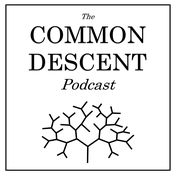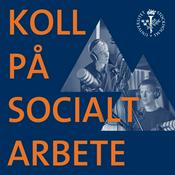393 avsnitt
Louis Rothschild, "Rapprochement Between Fathers and Sons: Breakdowns, Reunions, Potentialities" (Karnac, 2023)
2026-1-26 | 1 h 7 min.Today I spoke with Dr. Louis Rothschild about his new book Rapprochement Between Fathers and Sons Breakdowns, Reunions, Potentialities (Karnac, 2024). Our conversation moved freely between theory, generational attitudes, thinkers, and personal vignettes.
What is a good enough father? What is the difference between a man of achievement and a man of power? Who is the father of the mother’s mind? What happens when a father enables holding? How is masculinity valued by other men? What is meant by phrases such as a “man’s gotta do what a man’s gotta do?” Why exactly do we need to “call the boy’s father?” How is the father’s role rendered invisible? These are some of the questions subsumed in the broader question of “Who nurtures and who is nurtured?” (And does the myth of the “self-made-man” indicate a man who exists without nurturing?)
“What I'm arguing”, says Rothschild, “is that that sexist dichotomy is a mirage in its own right and that attachment strings needn't be severed. They can be reworked over the lifespan and this idea of having this clean tidy break and going off to live your life where liberating the kid from this regressive maternal bond is the path to individuation, I think that's just patently false.”
Like an analyst, the book has been in formation for many years. “Percolating and distilling” as Dr. Rothschild says at the top of the interview. Motivated by the “way the culture was shifting” he sensed “that things I take for granted are actually a minority opinion.” Rothschild’s survey of sons includes mythology; Oedipus scripture; Issac. As well as the sons of literature; Sendak’s Max, Silverstein’s Boy, White’s Swan, and others. Affect rich case illustrations are also presented. The issues addressed in the book are the ones we are contending with in in analysis. They are the discussions we are having with our fathers, sons, and families. Rothschild’s book is essential and meets the clinical moment.
“Louis Rothschild’s book is both an outstanding representative of ‘return to the father’ and a unique explication of psychoanalytic thought on its own. This is a book of great literary elegance and impressive psychological wisdom.” Salman Akhtar, MD
Christopher Russell, LP is a psychoanalyst in Chelsea, Manhattan. He is a member of the faculty and supervising analyst at The Center for Modern Psychoanalytic Studies and The New York Graduate School of Psychoanalysis. His primary theorists are Sándor Ferenczi and Hyman Spotnitz.
Learn more about your ad choices. Visit megaphone.fm/adchoices
Support our show by becoming a premium member! https://newbooksnetwork.supportingcast.fm/psychoanalysisJuliane Maxwald, "Psychoanalytic Sex Therapy: Exploring the Unconscious Life of Sexuality" (Taylor & Francis, 2025)
2026-1-21 | 50 min.Today I spoke with Juliane Maxwald abut her new book Psychoanalytic Sex Therapy: Exploring the Unconscious Life of Sexuality (Taylor & Francis, 2025). Maxwald bridges psychoanalytic theory with contemporary sex therapy to demonstrate that sexual symptoms are rarely just about sex—they're embodied expressions of unconscious conflict, early attachment wounds, relational trauma, and unmet developmental needs. Through eleven richly detailed clinical cases—including Jon's shame-bound spanking fantasies, Connie's trauma-releasing masturbation, Maurice's porn use masking performance anxiety, Joelle's compulsive sexual behavior, Brian's BDSM healing, and Anna and Darren's painful desire discrepancy—Maxwald shows how integrating psychodynamic insight with behavioral interventions, somatic awareness, and trauma-informed care creates transformative healing. The book argues that sexuality is a "portal to the unconscious," where repetition compulsion, dissociation, shame, and erotic transference play out in the body, and that therapeutic work requires not just fixing dysfunction but decoding symbolic meanings, tolerating ambiguity, attending to countertransference, and creating relational safety where clients can reclaim embodied agency, authentic desire, and the capacity for surrender—while acknowledging that sometimes, pragmatically, "a cigar is just a cigar" and simpler medical or behavioral solutions serve clients best.
Learn more about your ad choices. Visit megaphone.fm/adchoices
Support our show by becoming a premium member! https://newbooksnetwork.supportingcast.fm/psychoanalysisAnna Fishzon, "The Impossible Return - Psychoanalytic Reflections on Breast Cancer, Loss, and Mourning" (Routledge, 2025)
2026-1-20 | 51 min.Today I spoke with Anna Fishzon about her new book The Impossible Return - Psychoanalytic Reflections on Breast Cancer, Loss, and Mourning (Routledge, 2025). The Impossible Return is a hybrid work of cancer memoir, psychoanalytic theory, and Soviet history that explores the author's experience with breast cancer through the lens of mourning, loss, and identity. Fishzon weaves together her personal narrative of mastectomy and reconstruction with psychoanalytic concepts—particularly the uncanny, shame, and the impossibility of fully mourning what has been lost—while drawing connections to her late Soviet Ukrainian childhood and her deep engagement with opera. The book examines how the reconstructed breast becomes an uncanny double, how the prosthetic oscillates between absence and presence, and how cancer survivorship involves living with "scanxiety" and perpetual waiting. Through this autotheoretical approach, Fishzon explores broader questions about memory as scar tissue, the relationship between voice and embodiment, and what she calls the "terribly obscure utopian" work of psychoanalysis—asking the impossible of both analyst and patient, much like perestroika's call for reconstruction. The work treats cancer survival not as a triumph narrative but as an ongoing, repetitive process of attempting to mourn something that remains fundamentally unmournable.
Learn more about your ad choices. Visit megaphone.fm/adchoices
Support our show by becoming a premium member! https://newbooksnetwork.supportingcast.fm/psychoanalysis- Analyzed by Lacan: A Personal Account (Bloomsbury, 2023) brings together the first English translations of Why Lacan, Betty Milan's memoir of her analysis with Lacan in the 1970s, and her play, Goodbye Doctor, inspired by her experience.
Why Lacan provides a unique and valuable perspective on how Lacan worked as psychoanalyst as well as his approach to psychoanalytic theory. Milan's testimony shows that Lacan's method of working was based on the idea that the traditional way of interpreting provoked resistance.
Prior to Why Lacan, Milan wrote a play, Goodbye Doctor, based on her experience as Lacan's patient. The play is structured around the sessions of Seriema with the Doctor. Through the analysis, Seriema discovers why she cannot give birth, namely, an unconscious desire to satisfy the will of her father who didn't authorize her to conceive. She ceases to be the victim of her unconscious, grasps the possibility of choosing a father for her child and thus becoming a mother. Goodbye Doctor has been adapted into a film, Adieu Lacan, by the director Richard Ledes.
Analyzed by Lacan features an Introduction by Milan to both works as well as a new interview with Mari Ruti about her writing and Lacan.
Matthew Pieknik, LCSW, MA is a psychoanalyst and clinical supervisor in private practice in Manhattan. He can be reached at [email protected]. www.matthewlpieknik.com
Learn more about your ad choices. Visit megaphone.fm/adchoices
Support our show by becoming a premium member! https://newbooksnetwork.supportingcast.fm/psychoanalysis - How well do we understand our relationship to sex? According to Oliver Davis and Tim Dean, authors of the new book Hatred of Sex (University of Nebraska Press, 2022), we tend to overlook the “unpleasurable pleasures” that are integral to sex. Sex undoes us, destabilizes us, takes us out of ourselves. Many of our 21st century cultural products—Queer Theory, traumatology, intersectional studies—secretly “hate” sex for these very reasons and build such hatred into their ideas. In our interview, Davis and Dean explain why a full understanding and experience of sex require our reckoning with these truths, and they offer conceptual tools for undertaking such a reckoning. This interview is a must-listen for anyone curious about the unspoken dimensions of sex.
Oliver Davis is a professor of French studies at the University of Warwick. He is the author of Jacques Rancière and editor of Rancière Now. Tim Dean is James M. Benson Professor in English at the University of Illinois at Urbana-Champaign. He is the author of Unlimited Intimacy: Reflections on the Subculture of Barebacking and Beyond Sexuality.
Eugenio Duarte, Ph.D. is a psychoanalyst and clinical psychologist practicing in Miami. He treats individuals and couples, with specialties in gender and sexuality, eating and body image problems, and relationship issues. He is a graduate and faculty of William Alanson White Institute in Psychiatry, Psychoanalysis, and Psychology in New York City and former chair of their LGBTQ Study Group; and faculty at Florida Psychoanalytic Institute in Miami. He is also a contributing author to the book Introduction to Contemporary Psychoanalysis: Defining Terms and Building Bridges (2018, Routledge) and has published on issues of gender, sexuality, and sexual abuse.
Learn more about your ad choices. Visit megaphone.fm/adchoices
Support our show by becoming a premium member! https://newbooksnetwork.supportingcast.fm/psychoanalysis
Fler podcasts i Vetenskap
Trendiga poddar i Vetenskap
Om New Books in Psychoanalysis
This podcast is a channel on the New Books Network. The New Books Network is an academic audio library dedicated to public education. In each episode you will hear scholars discuss their recently published research with another expert in their field.
Discover our 150+ channels and browse our 28,000+ episodes on our website: newbooksnetwork.com
Subscribe to our free weekly Substack newsletter to get informative, engaging content straight to your inbox: https://newbooksnetwork.substack.com/
Follow us on Instagram and Bluesky to learn about more our latest interviews: @newbooksnetwork
Support our show by becoming a premium member! https://newbooksnetwork.supportingcast.fm/psychoanalysis
Podcast-webbplatsLyssna på New Books in Psychoanalysis, The Rest Is Science och många andra poddar från världens alla hörn med radio.se-appen
Hämta den kostnadsfria radio.se-appen
- Bokmärk stationer och podcasts
- Strömma via Wi-Fi eller Bluetooth
- Stödjer Carplay & Android Auto
- Många andra appfunktioner
Hämta den kostnadsfria radio.se-appen
- Bokmärk stationer och podcasts
- Strömma via Wi-Fi eller Bluetooth
- Stödjer Carplay & Android Auto
- Många andra appfunktioner

New Books in Psychoanalysis
Skanna koden,
ladda ner appen,
börja lyssna.
ladda ner appen,
börja lyssna.








































